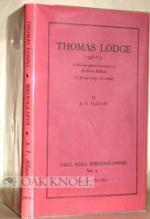|
This section contains 6,867 words (approx. 23 pages at 300 words per page) |

|
SOURCE: "Lodge," in The Elizabethan Prodigals, University of California Press, 1976, pp. 105-21.
In this excerpt, Helgerson claims that Lodge, like many of the characters he created, was torn between opposing postures of rebellion and submission.
Diogenes, the satiric moralist in Thomas Lodge's Catharos, suggests as the first in a list of remedies for love that "we ought to call to mind that sensuality and lust destroyeth and dissipateth a man's goods in such sort as it handled the prodigal child, who consumed all his substance with harlots."1 The allusion cannot be taken as evidence of Lodge's interest in the prodigal son. He borrowed it and the thirty pages surrounding it from an early sixteenth-century French book, La Somme des Pechez et le Remède d'iceux of Jean Benedicti. But both the source and the sentiment do seem to put Lodge on the side of the moralists. He did...
|
This section contains 6,867 words (approx. 23 pages at 300 words per page) |

|


